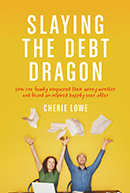
Cherie Lowe is known as the “Queen of Free.” She paid off $127,482.30 of debt through a combination of faith and finance. – Image courtesy of Cherie Lowe
After paying off more than $127,000 through a combination of faith and sound financial decisions, Cherie Lowe became known among her community as the “Queen of Free.” Now she’s released a new book, Slaying the Debt Dragon, to teach others her secrets. Here, we discuss her ideas and why she believes debt is not just bad for your checking account but also destructive for your soul.
RNS: You racked up $127,482.30 of debt without buying a yacht or splurging or purchasing a beach house. How the heck does this happen?
CL: The short answer is that it happens by not paying attention. I so wish we actually had something to show for so much debt; however, there remains no physical evidence of its existence. The bulk was student loan debt, followed by credit card debt, a car, a gap loan from when we were unemployed, and then an assortment medical debt and furniture bought on a payment plan.
RNS: You say you paid your debt off “through hard work and with God’s help.” Some would say you just worked your butt off. What does God have to do with it?
CL: When we first began the process of paying off debt, I used to dream that we would receive an anonymous check in the mail for the exact amount that we owed. I would concoct stories in my head that we could tell others of God’s perfect provision, giving Him all of the glory. That check never arrived but God still showed up and provided repeatedly. He provided extra jobs and blessed us with community who cheered us along. He pointed the way toward skills to help us manage money and maintained our health and well-being. He sustained our souls when we wanted to give up and reminded us of all we already had when we were jealous. I won’t deny that we worked our butts off but that wouldn’t have been possible without God.
RNS: Talk about the connection between debt and faith. How does the way we spend our money affect our spiritual lives?
CL: Debt is spiritual. The concept is woven through God’s gracious story of Jesus’ death and resurrection. Yet in a way, there is a strong pull to divorce the spiritual nature from our day-to-day lives. Even though I had gone to Christian college, spent all of my life in church, and even worked on a couple of church staffs, until we began paying off debt, I hadn’t paused to really contemplate how my everyday purchases and financial decisions were a reflection of the state of my soul. When I grasped for something that I couldn’t afford, I was saying, “God what you’ve given me isn’t enough. I need more.”
RNS: Let’s get practical. If people want to work on reducing their debt, how should they start?
CL: If you’re like me, you want five easy steps that you can follow to make the debt disappear within a matter of weeks. But the essential step of believing the goal is actually attainable has to happen before you can begin any strategy. I love Neil Gaiman’s paraphrase of G.K. Chesterton “Fairy tales are more than true: not because they tell us that dragons exist, but because they tell us that dragons can be beaten.” You need to believe that God is willing to step into your story and provide a way out. [tweetable]If you think you’re always to going to flounder when it comes to money, you’re probably right.[/tweetable]
RNS: What’s the hardest part of getting your finances in order and how can people overcome this nrdle?
CL: People are always looking for the “perfect time” to begin the process of paying off debt. They say things like “Once the kids are grown . . .” or “After we get beyond our current situation . . .” There is no perfect time to begin paying off debt, there is only today. You will always have a car that blows up, a sick child, a difficult circumstance.
From the nuts and bolts perspective, I think a lot of people return to unsuccessful methods of budgeting. If it hasn’t worked in the past, it won’t work now. Find a new process or tool to help you get your junk in order. Proverbs 26:11 is high on the icky factor but rings true when it comes to your finances. Don’t return to your financial vomit and expect things to be hunky dory. Throw off toxic patterns and find a new path.
RNS: Once someone gets out of debt, what should they do to insure they don’t fall back into it?
CL: The biggest advantage of not receiving that miraculous check in our mailbox was that paying off debt took us four years. The long game and painful sacrifices were a gift. So if you are in a long and grueling process of paying off debt, be encouraged. The more time it takes is actually a “no more debt” insurance policy. I’ve seen a number of people who were able to pay off debt because of an unexpected windfall. Unfortunately, because of the instantaneous nature of their debt slaying journey, many quickly dive back into debt.
[tweetable]When it comes to debt: Don’t pray for bigger checks; pray for bigger life lessons.[/tweetable]







